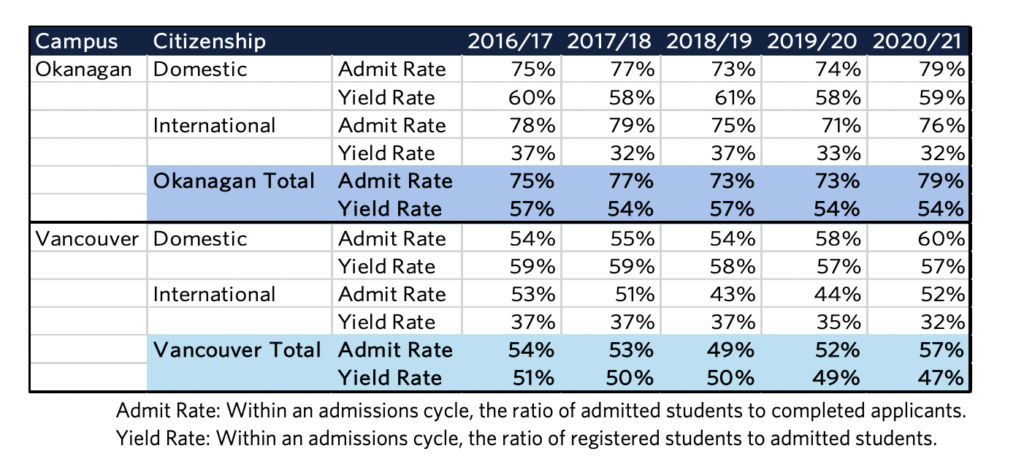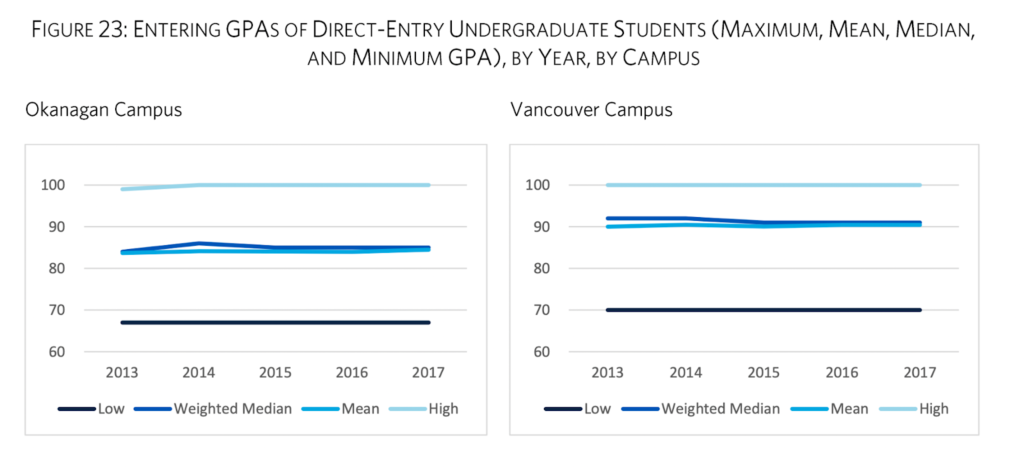Blog 10 – How to get into UBC?
#collegeadmission
UBC Overview
The University of British Columbia is recognized globally for its excellence in teaching, research, and prestigious reputation. With two campuses in the BC province, UBC is the home of 8 Nobel laureates. It continues to attract, nurture, and inspire more than 60, 000 students from Canada and 140+ countries around the world. According to the 2022 Times Higher Education World University Rankings, UBC is ranked the 37th among global universities and 2nd in Canada.
How Hard it is to Enter UBC?
Each year, UBC receives more than 40,000 completed applications for its undergraduate programs. In the 2020/2020 school year, the admission rates of domestic students are 58% of the UBC Vancouver campus, and 74% of the Okanagan campus. In contrast, international students have lower admission rates of 44% in Vancouver and 71% in Okanagan. You can find more admission rates in the table below.

(University of British Columbia annual enrolment report 2020/21)
Knowing the above data, you may feel the UBC admission rate is extremely high compared to the prestigious US colleges whose admission rates can be lower than 10%. However, you still need to be in the 90s to enter UBC Vancouver. In the 2020/2021 year, “the mean entering grade range, for all academic courses a student completed in the senior years of secondary school, was 82-84% for students attending the Okanagan campus; on the Vancouver campus, it was 89-91%” (University of British Columbia annual enrolment report 2020/21).
These entering averages have been pretty steady over the past years.
| Year | Vancouver | Okanagan |
| 2020/2021 | 89-91% | 82-84% |
| 2019/2020 | 90-92% | 86-88% |
| 2018/2019 | 91% | 85% |
(University of British Columbia annual enrolment reports)
You can find some older data in the following graph.

(University of British Columbia annual enrolment report 2017/18)
The admission averages vary by faculty as well. Even though UBC does not publish data on admission GPAs by faculty or program, based on decades of experience,
Giraffe experts believe competitive programs such as Sauder Business, Engineering, and Computer Science programs generally require an admission average above 92%.
What does it Take to Get into UBC?
In addition to academic performances, UBC is also looking for students who demonstrate strong individual and social skills.
For example, UBC considers communication skills, teamwork experience, self-initiation, and social responsibility as key assets when considering students’ applications.
As indicated earlier, when students possessing high school performances in the mid-90s are competing for their UBC positions, achieving academic excellence is normal. You should highlight your personal experiences to promote your personal brand image, hence increasing your probability of receiving UBC’s offer. Therefore, you should pay close attention to extracurricular activities. Check our previous blogs on the myth of extracurricular involvement to gain more insight.
Meanwhile, UBC needs students to answer why they choose their intended faculty and why their future studies at UBC can contribute to personal career success.
As observed from the personal profile questions in the past three (3) years, UBC requires undergraduate applicants to describe their career plans and elaborate on their possible success once they acquire sufficient knowledge and experience from their UBC studies. You should notice that such career-relevant questions were typically reserved for MBA applicants a few years ago. So, think carefully about why you need to study your major at UBC. Check our Career Planning Service to know more about how to find a personality-major fit in order to be better prepared for these application questions.
Entering UBC is not an overnight project. It takes years of effort for you to prepare for both your academics and your personal profile.
You should start as early as in grade 9 in considering these questions. You need to plan your school courses, extracurricular exams such as APs, and activities that are directly relevant to your future career path. Make sure that you adopt a result-oriented approach so that you demonstrate achievement from each event/activity.
How can You Stand out in Your Application?
As discussed, you should highlight your personal involvement in these pillar fields: social involvement, technical expertise, teamwork, and personal achievements. Think carefully about your intention to include a particular activity because UBC only allows you to place five (5) activities in total. You should demonstrate the purpose of attending an event, your personal characteristic traits revealed/developed through this activity, your personal milestone/success, and your lessons learned through this experience.
Make sure that your personal traits, experiences, and expertise match your prospective faculty. Always answer why you select this particular faculty, why your personality fits this major, why you can survive from UBC’s rigorous curriculum, and how your future UBC experience contributes to your career success.
When you follow our suggestions listed here, you should develop a high personal profile score. If you have outstanding academic performances, you will have a high likelihood of receiving UBC’s offer. You should understand that receiving an offer from your dream university is a probability, not a certainty, because you are competing with other highly qualified candidates.
To learn more about how we help you enter UBC, click our University Application Service for more details.
Reference
Mukherjee-Reed, A. (n.d.). University of British Columbia annual enrolment report 2020/21. Ubc.Ca. Retrieved March 12, 2022, from https://pair.ubc.ca/wp-content/uploads/sites/145/2021/01/UBC-Annual-Enrolment-Report-2020-21.pdf
What was UBC’s government-funded domestic FTE count by campus? (n.d.). Ubc.Ca. Retrieved March 12, 2022, from https://pair.ubc.ca/wp-content/uploads/sites/145/2020/11/2017-18-Enrolment-Report.pdf








